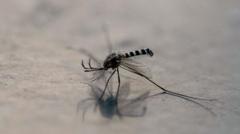In a unique approach to address the rising threat of dengue fever, Barangay Addition Hills, a densely populated area in Manila, Philippines, has announced a cash reward program for residents willing to capture mosquitoes. The village chief, Carlito Cernal, revealed that locals will earn one peso (less than two US cents) for every five mosquitoes or their larvae they bring in, as part of efforts to curb the spread of the disease.
This initiative follows a concerning spike in dengue infections within the community, which resulted in the tragic deaths of two students. Currently, the program will be in effect for a month and seeks to complement existing health measures aimed at controlling mosquito populations. Cernal noted that 21 individuals have already participated, bringing in a total of 700 mosquitoes and larvae.
While the bounty has brought about ridicule on social media—with comments suggesting the emergence of "mosquito farming"—Cernal maintains that urgent action is necessary in one of Metro Manila's most densely populated regions. Health authorities in the Philippines have recorded 44 dengue cases in the area so far during this recent surge.
Dengue fever poses significant health risks, causing severe symptoms like internal bleeding in extreme cases, and is particularly rampant in tropical urban locales where conditions favor mosquito breeding. The Department of Health (DOH) has reported a national increase in cases due to seasonal rains, urging citizens to keep their environments clean and to eliminate potential breeding spots.
In addition to dengue, authorities are also monitoring a spike in other illness rates, such as influenza-like diseases and leptospirosis, which can arise from flood water exposure. As the rain continues and dengue cases rise, the local community is pushing forward with creative solutions to increase awareness and tackle the health crisis head-on.
This initiative follows a concerning spike in dengue infections within the community, which resulted in the tragic deaths of two students. Currently, the program will be in effect for a month and seeks to complement existing health measures aimed at controlling mosquito populations. Cernal noted that 21 individuals have already participated, bringing in a total of 700 mosquitoes and larvae.
While the bounty has brought about ridicule on social media—with comments suggesting the emergence of "mosquito farming"—Cernal maintains that urgent action is necessary in one of Metro Manila's most densely populated regions. Health authorities in the Philippines have recorded 44 dengue cases in the area so far during this recent surge.
Dengue fever poses significant health risks, causing severe symptoms like internal bleeding in extreme cases, and is particularly rampant in tropical urban locales where conditions favor mosquito breeding. The Department of Health (DOH) has reported a national increase in cases due to seasonal rains, urging citizens to keep their environments clean and to eliminate potential breeding spots.
In addition to dengue, authorities are also monitoring a spike in other illness rates, such as influenza-like diseases and leptospirosis, which can arise from flood water exposure. As the rain continues and dengue cases rise, the local community is pushing forward with creative solutions to increase awareness and tackle the health crisis head-on.




















